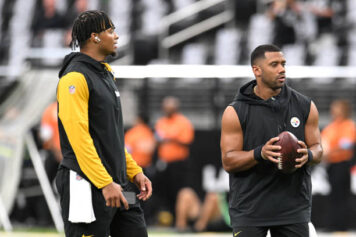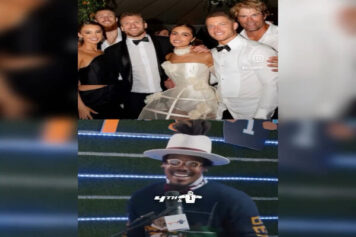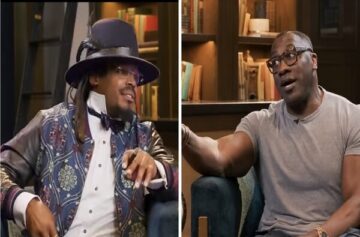I came across a tweet last week from ESPN’s Hugo Balta with an interesting story link from a 2014 Time Magazine piece, The Real Problem When It Comes to Diversity and Asian-Americans. Writer Jack Linshi explored the successes and challenges for Asians and Asian-Americans in this country as the model minority.

(Photo Credit: time.com)
They, with their steely work ethic and quiet perseverance, have achieved at the highest levels of many industries including tech, education and business.
With such great success, the prevailing thought is that theres no need for advocacy for the group as a collective entity. In other words, all Asians/Asian-Americans are the same. This logic sounds very familiar.
All Blacks Are Thugs And On Welfare
Cam Newton is now a ubiquitous figure in the daily news cycle. The MVP quarterback has led the Carolina Panthers to an NFC Championship and a berth in Super Bowl 50. Whether it’s dancing in the end zone, giving footballs away to kids after touchdowns or just flat-out balling, he has become a force in, and the face of, todays National Football League.
This young, affable and successful black man in the country’s most popular sport doesn’t necessarily sit well with people. Then again, a successful Tom Brady doesn’t sit well with everyone either. This is, after all, the NFL we are talking about fantasy football and team success tends to be very close to sports fans’ hearts.

(Photo Credit: USA Today)
Still some view Newton with disdain, calling him deplorable because of how he carries himself on the field. Where some see someone who is emblematic of all that is wrong with modern day sports, I see someone who danced with excitement and exultation because he scored a touchdown for his team. He danced because there was a fierce battle being waged on the field. Men who were stronger and bigger than he they wanted to destroy him.
Because of the cultural leanings of his dance moves and, let’s be real here, because of how he looks, he’s been labeled selfish, a braggart, cocky, arrogant, a threat. In other words, its the usual narrative that surrounds African-American athletes. This logic and path of thought sounds very familiar.
All Native Americans Are Drunk And Unemployed
Talk with Gyasi Ross long enough and your brain goes into overdrive. In a 2015 Shadow League story, he said, …it is important for survival purposes that I teach my 8-year-old son that he’s going to be huge like me. There are certain expectations that come with that. He’s going to have beautiful brown skin like me. And there’s going to be this expectation that he’s not intelligent or whether that he’s prone to violence or he’s going to drop out or be an alcoholic. Whatever those stereotypes might be those are going to be there.
Ross defies the Native American stereotype as an author, lawyer, activist and sought-after speaker on Native American issues. But he knows that he cannot fight against how people see him on the outside.
You can argue with the statistics, you can argue with the impressions, I don’t want those to be there, he said. Whether or not you want them to be there, they’re there. So you have to be mindful of both of those expectations, your own personally and also the exterior looking in.

(Photo Credit: USA Today)
Being mindful of his culture and the external stereotypes is a delicate balance. Sure, people will seek him out for topics like the Washington Redskins name controversy, but do they ask about the lack of access to sports equipment and training for Native kids? When is the last time a mainstream sports outlet wrote a Native American-related story that wasnt about the Redskins?
When was the last time we explored Sam Bradford’s importance as a Native American role model, or his accomplishments as a Heisman Trophy winner within the context of the Indian sporting tradition and overall American experience?
Its not important enough for mainstream sports to discuss. Its not part of the narrative they want to cover. What can Ross or any other Native American tell us about sports or life? All Native Americans are the same – drunk and unemployed. This logic sounds very familiar.
All Hispanics Are Immigrants And Lazy
I wasnt necessarily trained on how to handle racism as a kid. My school was fairly diverse. I had friends of various races and ethnicities – it was normal to me. Minor skirmishes happened, but it was nothing out of the ordinary.
Growing up in a single parent home, I learned when given a job to do, you do it. Dont seek out accolades – just work hard and the rewards will come. I saw my grandparents work hard too. Hard work was just handed down through the generations.
My ancestors came to America many generations ago. But, I know there are some in this country who would take one look at me and say, immigrant. I know this because at various points in my life, I have been called Mexican, Puerto Rican, Spanish, Native American and yes, even Arabic, solely based on how I look.
Many Latin-American baseball players have been called lazy. The way that the Los Angeles Dodgers’ Cuban sensation Yasiel Puig plays the game, with his one-handed glove-snapping catches or bat flips, doesnt sit well with traditionalists. They dont like how culture has invaded their game.

(Photo Credit: USA Today)
Whether our family has just arrived in America or lived here for generations, culture is a part of our identity in sports and in life. When we arrived doesnt matter to some, however. All Hispanics are immigrants and lazy. This logic sounds very familiar.
Diversity Is Not Just Black And White
All of my children are of mixed race. Society struggles to look beyond skin color, so do I teach them to identify only with their skin tone? If I do that, are they disconnecting with part of their identity? Or, do I teach them about culture and heritage? Society struggles with culture and heritage as an identifier. Its not easily packaged into skin tone.
Therein lies yet another struggle. Race and diversity topics lean toward black-and-white only. The Oscars were in the news for their very white-centric nominees in the acting categories. Actress Jada Pinkett and writer-director-actor Spike Lee were outspoken on The Oscars lack of diversity.
News and entertainment outlets on TV, in print and online tackled the issue. Most of them talked about diversity in a strictly black-and-white context. They pointed to Will Smiths performance in Concussion or the African-American actors in the movie Straight Outta Compton being ignored. And, you know what? Theyre right. But, then I thought, Well, at least they got the opportunity.
Where were the opportunities for Hispanic or Native American or Asian or Arabic actors? If we say that there is a lack of diversity, shouldnt other races be in the discussion?
How many view diversity in this country, especially in media, is box-like thinking. They have their own perspective and thats the extent to which they see an issue, I guess. As long as they are included in the discussion, then it must be diverse, right? Thinking outside the box is not allowed.
The song #WhitePrivilege by @macklemore does what most racial dialogue does in this nation-reduces the convo as only between black or white
Big Indian Gyasi (@BigIndianGyasi) January 24, 2016
Whats the problem?
When we only think in black-and-white terms, we tend to generalize. We generalize topics…and people.
All blacks are thugs and on welfare.
All Native Americans are drunk and unemployed.
All Hispanics are immigrants and lazy.
A sweeping generalization of any demographic group is irresponsible. Its an assumption based on belief or ones personal experience with said group. Little effort to fact-find is necessary when a simple re-tweet is all thats needed.
In todays social media world, however, assumptions often turn into facts, rendering any substantive dialogue about the true nature of race and diversity in America into a defensive, dishonest argument as opposed to what it should be: a celebration of differences that strives for greater inclusiveness.



